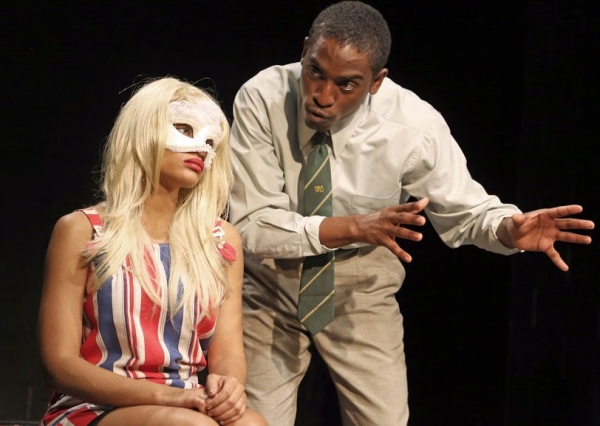Dutchman
Woodie King Jr.’s New Federal Theatre launches its season-long tribute to the late Amiri Baraka with his racially polarizing drama.

(© Gerry Goodstein)
Amiri Baraka left a controversial legacy behind him following his death a little over a year ago. The African-American author's poems and plays take a sharp knife to our country's racial experience. The New Federal Theatre, run by Woodie King Jr. (a longtime friend of Baraka's), has dedicated its 46th season to Baraka's contentious works, beginning with his 1964 Dutchman, now running at the Castillo Theatre.
King, who directs his company's opening production, seizes on Dutchman's allegorical content to create a nightmarish environment for the one-act play. Wagner's The Flying Dutchman blares over images of slave ships, evoking the title's reference to the Dutch East India Company and its gruesome 17th century voyages from West Africa to America. The lights come up on a New York subway car (designed by Chris Cumberbatch), where we watch an interaction unfold between a white woman named Lula (Ryan Jillian Kilpatrick) and a buttoned-up black man named Clay (Michael Alcide). After aggressively initiating conversation, Lula engages the mild-mannered young man in a sexualized game of cat and mouse, while taunting him with stereotypical assumptions about his personal life — most of which turn out to be true. Yet Clay, like his malleable name suggests, remains putty between Lula's fingers, eagerly awaiting her next sexual advance.
Kilpatrick imbues Lula with eerie overtones, wearing her manipulative character's ironically patriotic dress (designed by Carolyn "Lady Girl" Adams) like a heartless succubus. Though traditionally played by a white actress (Jennifer Mudge performed the role opposite Dulé Hill in a 2007 revival at the Cherry Lane Theatre), Kilpatrick wears a white face mask and bleach-blond wig to cover her own brown skin and hair. "White" passengers that trickle into the train car throughout the hour-long scene similarly don porcelain-colored masks, chuckling in unison to Lula's degrading comments, while Clay buckles with painful subservience. The power dynamic that this preliminary tête-à-tête establishes between Baraka's two leading characters is straightforward in its allusions, regardless of a director's personal staging preferences. However, as King blatantly marks his white characters, he draws an impassable line down the center of the stage, as if the two sides were preparing for war.
Though unanswered questions and blurry boundaries are what plays often thrive on, the unapologetic content of Baraka's Dutchman lends itself well to these clear demarcations. Rather than a forum for discussion, the play offers an outlet for very specific grievances about American racism and the sweeping violence that could potentially end it. Clay ends up serving as Baraka's mouthpiece for these opinions, finally pouring his pent-up rage into a vicious monologue, born from a deep well of unrelenting pain. Alcide delivers the speech with both vehement passion and threatening venom as he loosens the tie and shirt collar that Lula, moments ago, criticized as symbols of his submissive assimilation to white America. His transformation, much like the play itself, is shocking, gruesome, and brazenly raw. The language is polarizing, the statements hard to digest — but if recognition of Baraka's impact on the American theater is the goal, there is no tribute more fitting.








